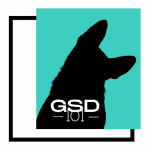Twelve months marks a significant point in your GSD puppy’s life. This is when they begin their transition from puppy to adult, and with that comes a few changes to their nutritional needs.
Adult large breed dog food (wet or dry) that contains high-quality protein, fat, and carbohydrates is the best food for a 12-month-old German Shepherd. Supplements such as omega fatty acids, probiotics, and glucosamine can be beneficial if recommended by a veterinarian.
In this article, you will learn what are the essential nutrients for a 12-month-old GSD. And we will also include the dog food you should avoid. You’ll walk out with a list of the best dry, wet and raw dog food.
You may also like:
The Best Food For German Shepherd Puppies: A Beginner’s Guide
Best Chew Toys for German Shepherd Puppies
How to Stop Food Aggression Towards People in German Shepherds?
Hip Dysplasia In German Shepherds: Everything An Owner Needs To Know
How to Extend A German Shepherd‘s Lifespan? 6 Tips You Must Know
Dietary Changes for an adult German Shepherd
There are a few changes to your puppy’s diet as your German Shepherd approaches the adult stage at 12-month-old.
Your GSD’s growth will start to slow down at the 12-month mark, meaning they need fewer calories overall. Your best bet is to switch from puppy food to adult food, along with decreasing the amount of protein and carbs as they mature.
Three essential nutrients for a 12-month-Old GSD
German Shepherds are large dogs that can weigh between 70 and 100 pounds when they’re full grown. A blend of high-quality proteins, fats, carbohydrates, vitamins, and minerals will be essential for them to live a healthy life.
#1 Protein
Protein is the cornerstone of your GSD’s tissue and muscles. Getting enough protein in every meal will help ensure a physically strong and healthy dog.
The Association of American Feed Control Officials (AAFCO) recommends that dog foods for large breed dogs, like your GSD, should contain between 30% to 40% of high-quality protein. And it can be found in:
- Poultry & Eggs
- Salmon
- Lamb
- Grass-fed beef
#2 Fat
They also recommend that your dog’s diet contain between 15% and 30% high-quality animal-based fats.
Fat is responsible for a considerable number of functions like bone and joint development, digestion, and hormone production.
Dietary fats need to come from quality fat sources containing essential fatty acids which will make your GSD skin and coat healthy. Here are some great fat sources for your puppy:
- Chicken fat
- Fish oils
- Beef fat
#3 Carbohydrates
Carbohydrates are the final nutrition to consider. Adult German Shepherds need between 5% to 8% carbohydrates from their diet.
These are needed to give your GSD energy to happily meet each day’s activities, as well as grow. Carbs are also a great way to manage your GSD’s weight. The best sources of carbohydrates can be found in:
- Whole oats
- Potatoes
- Rice
- Sweet potatoes
However, it’s too easy to stumble upon low-quality dog food made with wheat-based products, soy, and corn.
These have all been proven to deter digestion and cause most food allergies. So you have to be mindful when choosing your dog food.
Can German Shepherds have white rice?
German Shepherds can literally have white rice every day. You should feed no more than about a quarter cup for a large dog like German Shepherds. (Source: Farmer Dog Digest) Vets often recommend white rice for dogs with an upset stomach.
Best supplements for your 12-month-old German Shepherd
A proper diet full of essential vitamins and minerals is vital in maintaining your GSD’s beautiful coat, preventing excessive shedding, and building up its immune system to stay healthy.
The best vitamins and minerals come from real fruits and vegetables such as berries, peas, and lentils.
For the most part, if you’re feeding your German Shepherd with high-quality dog food, you shouldn’t have to worry about giving it supplements.
But since you are still reading, here are a few important supplements that are proven to be essential to the healthy growth of dogs of all kinds.
Omega-3 and 6 fatty acids: They are one of the best supplements available. They promote a silky coat, good skin health, and a stronger immune system. Especially important for GSDs, they help with joint health.
Antioxidants and prebiotics: These are other supplements that vets recommend for dogs as they age.
Glucosamine: It is another good supplement for GSDs as it’s believed to help with arthritis. Joint issues are always an to be considered with GSDs.
As a general guideline, consult your veterinarian before providing your dog with supplements.
- Zesty Paws Multifunctional is a great all-round supplement with included fatty acids
- Cosequin Soft Chews is a good option as a glucosamine supplement.
- VetriScience Laboratories Vetri Mega Probiotic will provide good probiotics to your GSD.
Fresh Water
On top of everything, you also need to provide your GSD with a supply of fresh and clean water at all times.
Just like how it works in humans, water is very important for a dog’s digestive system. Water helps dogs digest their food and then aids in the absorption of those nutrients.
Make sure that you’re always cleaning the water bowl regularly to ensure the water is clean.
What are the dog foods to be avoided?
Once you’ve learned what is the best food for your dog, it’s also very important to be aware of the three worst ingredients you can find in dog food – which you should avoid as much as possible.
And according to Dr. Marty, who coined these ingredients as “dog health disruptors, can cause poor digestion, irregular stool habits, overweight, skin problems, joint pain, and even depression in dogs.
And they are:
#1 Preservatives
They deter digestion and prevent your dog from getting the proper nutrients from their food.
#2 Fillers
Fillers are cheap substitutes for meat, e.g. heavy grains like soy, wheat, barley, flour, white rice, and corn.
#3 Meat by-products
These are slaughterhouse waste (e.g. organs, feet, beaks, brains, undeveloped eggs, pieces of tumors, intestines). And sometimes labeled as:
- Chicken-by-product
- Beef-by-product
- Lamp-by-product
- Duck-by-product
- Meat meal or Meat and bone meal (these can contain the road-killed or dead animals)
Read this post to learn more:
The Best & Worst Dog Foods Ever – According to a 45-Year Veterinarian
Best Dog Foods for a 12-month-old German Shepherd
At 12 months, a German Shepherd can digest a variety of types of food. If you prefer to use dry or wet food, you can change from puppy to adult dog food. You can also switch to a raw food diet at this age.
The best food for your German Shepherd is rich in high-quality animal protein with plenty of healthy fats and the optimal balance of essential nutrients.
Here’s a list of the best dog food you can find for your 12-month-old German Shepherd:
Best Wet Food
Based on vet recommendations, here are some of the best wet foods. Ensure a good source of protein is the first ingredient shown on the ingredient list, although it is typically second to water.
- Royal Canin Adult is a good option for large breeds like GSDs. You can rest assured your dog is getting quality food as Royal Canin is one of the most reputable brands out there.
- Candidae All Life Stages might not be specifically made only for large breeds but is still a good option to consider for your GSD as it has all the necessary nutrients needed.
- Wellness Complete Health is also a good option, with a range of flavors.
Best Dry Food
Dry food is one of the easiest and most effective ways of feeding your soon-to-be adult GSD. There are plenty of high-quality foods made with the needs of large breed dogs in mind. Just be sure a meat source is the first ingredient on the ingredient list.
- Hill’s Science Diet is another good food from a highly reputable brand.
- Wellness Core Grain-Free has all the nutrients your GSD needs and none of the grain fillers.
- Blue Buffalo Life Protection Formula is a great dry food that has a number of ingredients to aid with joint health.
Best Raw Food
You can also switch your GSD’s diet to a raw food diet. These diets are surging in popularity as they have a host of benefits for your dog. That being said, wet and dry foods are still viable options.
- Nature’s Variety Instinct is a blend of high-quality raw food and kibble that your GSD will be sure to love. As a mix, it has many of the benefits of both dry and raw food.
- Steve’s Real Food is another excellent raw food for your dog. It contains no antibiotics or hormones and is fortified with goat’s milk.
In Closing
At 12 months old, you can change your GSD to an adult diet. Be sure to reduce calories appropriately as they have mostly stopped growing at this age.
Nothing contained in the website is or should be considered, or used as a substitute for, veterinary medical advice, diagnosis or treatment. Always consult your vet when your dog is showing dietary changes.
Further questions
How much food should I feed my 1-year-old German Shepherd?
In general, young German Shepherd adults (12 months up) need between 1,500 to 1,700 calories per day. Full-grown German Shepherds (18 to 24 months) require between 2,000 and 2,250 calories per day.
How many times should I feed my 1-year-old German Shepherd?
Much like the feeding amounts, your German Shepherd’s meal frequency will vary depending on its age. Here’s how many times you should feed your German Shepherd according to their age::
- A young puppy (8 weeks old and below): 4 daily feedings spaced at equal intervals.
- Puppy (8 weeks to 9 months old): 3 daily feedings spaced at equal intervals.
- Young adult (9 months to 12 months old): Two daily feedings, once in the morning and the other in the evening, and about 12 hours apart.
- Adult to full-grown (12 months old above): Two daily feedings unless advised on a different schedule by the veterinarian.
For evening meals, it would be best if you feed your German Shepherd 2-3 hours before bedtime. That way, you’ll prevent your dog from having digestion problems and needing to go on toilet breaks during the night.
How big does a German Shepherd grow?
The average size for an adult male GSD is around 24 to 26 inches tall at the shoulder and weighs between 85-100 pounds. A fully grown female GSD is about 20 to 22 inches tall and weighs from 60 to 75 pounds.
Read more: German Shepherd Weight Chart: Is My Dog Overweight or Underweight?



